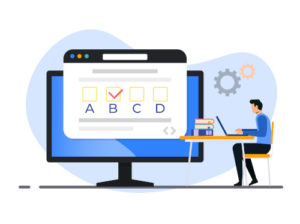While it was already relatively common practice before the COVID-19 pandemic, remote proctoring has become even more popular at institutions across the nation, leading to concerns and the need for important considerations as these systems are designed.
In response to the rapid growth in online learning and testing fueled by the pandemic and economics of education, the Association for Computing Machinery’s US Technology Policy Committee (USTPC) has released a Statement on Principles for the Development and Deployment of Equitable, Private, and Secure Remote Proctoring Systems. The statement provides a framework to guide those developing and deploying remote proctoring systems to ensure that these systems are private, secure, fair, and accessible for all users, among other important features.
The new statement refines and expands upon principles first developed and published in August of 2021 as the COVID pandemic increased the use of, but not necessarily the adoption of, adequate policies and practices to govern such systems.
The USTPC authors note that, as remote proctoring technologies emerge as a pervasive component of online education, institutions and technology vendors at minimum must address major issues of equity, privacy, security, accessibility, and efficacy.
Among its 25 proposed principles, key recommendations outlined in the statement include:
- Privacy: Remote proctoring technologies should incorporate end-to-end encryption for all test-taking data, minimize the amount of data collected, and set specific limits on retention.
- Mitigating AI bias: These technologies often rely on automated algorithms which are known to show bias, especially based on race and gender. Providers must work to assure and demonstrate that their systems do not discriminate against students.
- Access: These technologies should accommodate students of many backgrounds, for example those with disabilities, those who are homeless, and students with limited broadband access.
- Uniform certifications: Educators, researchers, and technology providers should develop uniform benchmarks and certification procedures to assess and document the comparative effectiveness of remote proctoring systems.
“During the COVID-19 pandemic, teachers and students experienced an abrupt shift to online teaching and learning, including the use of remote proctoring tools,” explained Christopher Kang, a PhD student at the University of Chicago and lead author of the new USTPC Statement. “We hope our framework helps educators, students, and e-proctoring developers better design and deploy these systems. As we move toward hybrid learning, educators and students are asking questions such as, ‘Should we continue using e-proctoring?’ and ‘What costs are incurred when we enjoy the convenience of online tests (e.g., with online standardized assessment tests)?’ This Statement contextualizes the costs of e-proctoring and key design considerations. We consider multiple concerns, including how systems can minimize costs to user privacy, how to make systems accessible, and the potential perils of using automated algorithms to flag suspicious behavior.“
“We were one of the first technology policy organizations to create a public and policy-maker consciousness of remote proctoring systems and their power over students’ futures,” added USTPC Chair Jeremy Epstein. “When these systems are deployed, individual students have no choice but to use and rely on them, and the determinations these systems make can profoundly impact their academic and professional careers. USTPC’s work here complements our recent Statement on the Principles for Responsible Algorithmic Systems. A common theme with all our policy products is to guide the development of new computing technologies so that they serve the broader society in a beneficial, not adverse, way.”
“The dialogue around e-proctoring often focuses on cost (and how these systems can enable e-learning). ACM’s Statement is a framework that expands the conversation: we should also consider how these systems likely have negative impacts on student privacy, accessibility, and equity,” said Kang.
“As a student, a Wired article approached the issue from a conceptual angle: how does mandating surveillance software in schools normalize surveillance? We then deepen the analysis and enumerate specific points as to how e-proctoring can more subtly affect students,” he added. “For example, we noted that RTA software could cause egregious violations of student privacy, require significant computer resources, or introduce additional financial burden for students using the software. These costs are often not felt by the purchasers of e-proctoring software — like universities or educational boards — but pose potential harms to users.
“Moving forward, administrators and teachers will judge what trade offs are justified: do we condone monitoring to ensure compliance with academic integrity policies? Do we accept inaccessibility to standardize assessments? It seems too heavy-handed to advocate banning e-proctoring tools, but our work uncovers a number of risks that suggest e-proctoring is a tool best used sparingly, if at all.”
In addition to Kang and Epstein, the Statement on Principles for the Development and Deployment of Equitable, Private, and Secure Remote Proctoring Systems was written with contributions from UTSPC AI & Algorithms Subcommittee Chair Jeanna Matthews, Digital Governance Subcommittee Co-Chair Simson Garfinkel, and committee member Cory Doctorow.
This press release originally appeared online.
- Report forecasts a ‘surge’ in GenAI adoption - April 26, 2024
- Where are microcredentials today–and where are they going? - April 22, 2024
- First-generation students are more likely to seriously consider leaving college - April 17, 2024

